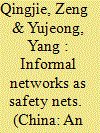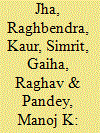| Srl | Item |
| 1 |
ID:
122924


|
|
|
|
|
| Publication |
2011.
|
| Summary/Abstract |
This essay examines how the definition of food security has evolved over the years and the causes of food insecurity. It looks at the state of food security in India and the US. It analyzes the food assistance programmes or short-term responses (other than the long-term goals of increasing agricultural productivity, controlling population growth, etc.) of the Indian and American governments to the problem of food insecurity and the challenges they face in implementing these responses. It identifies the target groups for these schemes and the eligibility requirements. Further, the essay analyzes the steps the US and India have taken to attain and maintain food security at the domestic level and makes an assessment of how far they have succeeded. Finally, it compares the programmes and policies of the two governments and concludes that the US has been more effective in dealing with food insecurity than India mainly because its mechanisms target the groups better and deliver the benefits more efficiently.
|
|
|
|
|
|
|
|
|
|
|
|
|
|
|
|
| 2 |
ID:
155932


|
|
|
|
|
| Summary/Abstract |
The current Chinese leadership that assumed power in late 2012 has launched an anti-corruption campaign that is unprecedented in magnitude. The sheer number of high-level officials cracked down by the Communist Party’s disciplinary body prompts a much speculated question in China studies: how do the dynamics of informal networks affect the Party’s disciplinary punishment of senior cadres? This article initiates the answering of this question with systematic evidence. The authors highlight the threat of rectification campaigns hanging over the bureaucratic system and thus inducing officials to attach themselves to powerful patrons whose protection offers pivotal career security for lower-level clients. Based on the authors’ findings from a sample of over 500 provincial officials in office when the current campaign started, those tied to incumbent members of the Politburo Standing Committee were less likely to be investigated for corruption than those without such ties. Factional ties with retired members of the same body, however, did not provide similar protection. The authors’ analysis helps explain the pervasiveness of personal dependence and factional activities in China’s political system and also sheds light on the complex interaction of informal rules and formal institutions in authoritarian regimes.
|
|
|
|
|
|
|
|
|
|
|
|
|
|
|
|
| 3 |
ID:
131244


|
|
|
|
|
| Publication |
2014.
|
| Summary/Abstract |
The workfare scheme, the National Rural Employment Guarantee Scheme (NREGS), and the direct food subsidy programme, the Targeted Public Distribution Scheme (TPDS), represent two social safety nets instituted in India as anti-poverty measures. This paper examines whether from the point of view of individual households the two programmes are substitutes or complements, as this will shed light on the appropriateness of the design of the two programmes. Based on primary household data collected for the Indian states of Rajasthan and Madhya Pradesh (MP), we show that, in Rajasthan, a large percentage of households consider TPDS and NREGS programmes to be substitutes for each other, while in MP the households often perceive the two programmes as complements. Thus it appears that the two programmes are better designed in MP since an incentive for participation in one programme has desirable side effects on participation in the other. Correlates of participation in the two states are identified and the paper advances several policy conclusions.
|
|
|
|
|
|
|
|
|
|
|
|
|
|
|
|